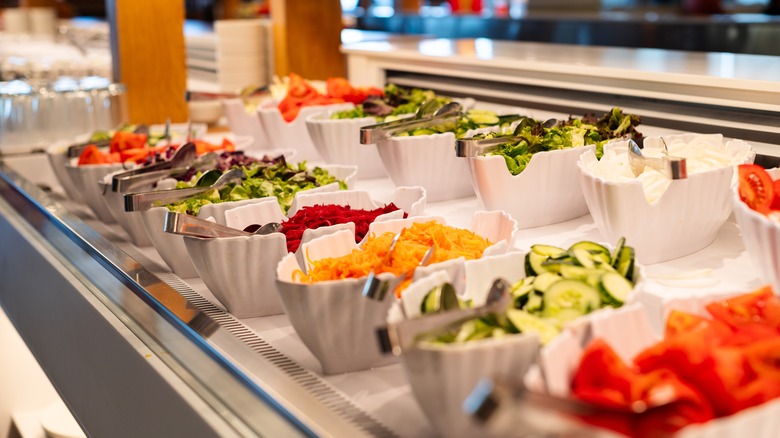The Unexpected Restaurant Chain Where An Unlimited Salad Bar Still Exists
In today's dining landscape, there aren't many salad bars left for customers to build their own plate full of leafy greens and toppings. However, one restaurant chain is keeping the tradition alive: Ruby Tuesday. The casual dining chain is known for its Endless Garden Bar, with over 55 items for guests to select and serve for themselves. Diners can choose from a wide variety of greens; other produce like edamame, tomatoes, and mushrooms; dressings like ranch and Thousand Island; and even pre-prepared potato and pasta salads.
Not only does Ruby Tuesday offer an unlimited salad bar, but you can also purchase a month-long salad bar membership. Since 2024, diners can pay $39.99 for a Garden Bar Pass that is valid for 30 days at most dine-in locations. The value of a garden bar pass equals to $2 per salad, as long as you utilize the pass every day. Salad bar lovers should absolutely take advantage of this deal — if they have Ruby Tuesday close by, that is.
As of the time of writing, there are just over 220 Ruby Tuesday locations in the United States. The chain actually filed for Chapter 11 bankruptcy back in 2020, closing 185 locations nationwide amidst financial struggles, mainly due to the COVID-19 pandemic. Luckily for fans of the casual chain, Ruby Tuesday emerged from bankruptcy a year later. The Garden Bar Pass could be a move to draw more customers in, but it might be a double-edged sword — many diners feel increasingly wary of salad bars, also due in part to the pandemic.
Why unlimited salad bars might be a thing of the past
Ruby Tuesday's salad bar is one of the few remaining examples of a dining option that was once very popular. While the exact origin of all-you-can-eat buffets and salad bars is still hotly debated, the trend starkly rose in popularity around the 1960s and 1970s. However, the presence of self-service food bars has dwindled drastically over the decades, as people have become more concerned about safe food handling practices and potential cross-contamination.
Salad bars and buffets have seen a major decline since the COVID-19 pandemic in particular. Changes to food shopping and dining trends — to focus on preventing the spread of the disease — has altered how customers interact with their food and fellow diners. Self-service tools like ladles and tongs are difficult to keep clean after every use, which really hurts the safety rating of the classic salad bar.
Additionally, not everyone who uses a salad bar is aware of the proper procedures. For example, it is actually considered bad etiquette to clean up spills at a salad bar, and those plastic sneeze guards may not be enough to prevent germs from spreading to the communal bowls. With such risks involved, some veggie lovers may prefer to build their own refrigerator salad bar, or simply grab salmon at Whole Foods' salad bar and avoid the other offerings.


